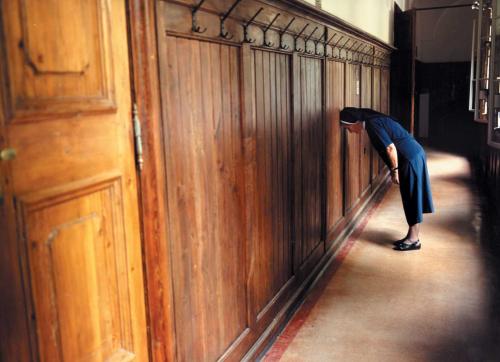Erwin Wurm
dal 25/10/2004 al 9/1/2005
Segnalato da
25/10/2004
Erwin Wurm
YBCA - Yerba Buena Center, San Francisco
I Love My Time, I Don't Like My Time: the first major survey of Austrian artist. The exhibition brings together significant works from his early career and his most recent efforts. Through experimentation in performance, photography, installation, drawing, video and text, the artist pushes the boundaries of sculpture by investigating elements of time, mass, and material form. At the center of the exhibit is the debut of Fat House, the latest in Wurm's series about mass that explores the wild and dark potential of sculpture and digital animation. Wurm creates highly-sophisticated work that remains accessible to the lay public

I Love My Time, I Don't Like My Time.
Yerba Buena Center for the Arts presents I Love My Time, I Don't Like My Time: Recent Work by Erwin Wurm. In the first major survey of Austrian artist, Erwin Wurm, I Love My Time, I Don't Like My Time, brings together significant works from his early career and his most recent efforts. Through experimentation in performance, photography, installation, drawing, video and text, the internationally-renowned Wurm pushes the boundaries of sculpture by investigating elements of time, mass, and material form. This one-of-a-kind solo show will travel nationwide through 2006.
''I can think of no other artist who captures the spirit of our times when there is a deep desire to bridge the gap between the art world and the rest of society as well as offer an approach to artmaking that subverts the commodifying pressures of the global art market,'' says René de Guzman.
The exhibition includes Wurm's early works such as 59 Positions (1992) and a range of his One Minute Sculptures (1997-present), as well as series like Instructions for Idleness (2001) and How to be Politically Incorrect (2002-2003). In addition to the photography, drawings, sculpture, and video work, at the center of the exhibit is the debut of Fat House/I Love My Time, I Don't Like My Time (2003), the latest in Wurm's series about mass that explores the wild and dark potential of sculpture and digital animation. Fat House, a life-sized house made to look cartoonishly bloated, incorporates I Love My Time, I Don't Like My Time, the animated video of another work about mass, Fat Car. This combination of works blurs the line between comedy and darkness, and indicates recent, spectacular innovations in Wurm's artmaking.
Similar to his well-known One Minute Sculptures, there will also be instructional drawings on-hand, that will invite audience participation. By combining their bodies with a variety of common objects according to the artist's instructional drawings, the audience becomes a vital component of the creation of these temporary sculptures. The humorous and poignant results of these interactions are documented with Polaroid cameras provided by the Center. Wurm's work is concerned with finding ways to extend the dialogue of the pioneering performance and conceptual art of the 1960s, into formal works of sculpture. He has staged art pieces that walk the delicate line of performance art. While appearing purely comical on the surface, there are complex messages beneath these temporary sculptures that elevate them above the status of mere incident, form, and behavior. These sculptures provide satirical commentary on life and art. His piece, How to Be Politically Incorrect, is humorous yet addresses serious subject matter–his reactions to a post-9/11 world.
Wurm creates highly-sophisticated work that remains accessible to the lay public. Because of these rare artistic qualities, the work's fans range from art world professionals to pop icons, such as the Red Hot Chili Peppers, whose music video ''Can't Stop,'' was inspired by the work of Wurm. With its many forms, Wurm's body of work contains an interactive quality, humor and generosity, as well as a serious, concerted investigation of sculpture.
Yerba Buena Center for the Arts
701 Mission Street 3rd San Francisco
Gallery Hours
Thu–Sat 12–8 pm
Sun, Tue, Wed 12–5 pm
The first Thursday of every month, 11 am–8 pm



